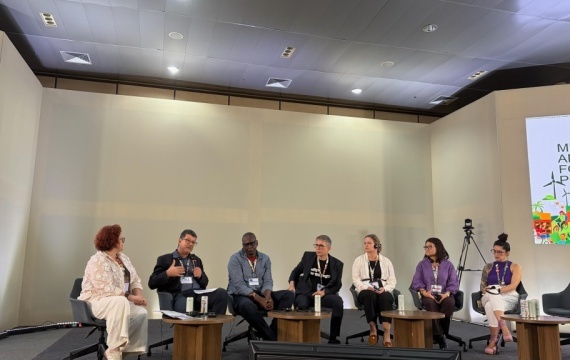FGV Participates in IPCC Panel at COP30
Continuing its participation in COP30, Fundação Getulio Vargas was represented by researcher José Antônio Puppim de Oliveira in the roundtable IPCC Special Report on Climate Change and Cities, held on the morning of Tuesday (November 11) in the Blue Zone. Co-organized by the Brazilian Ministry of Cities, UN-Habitat, and the COP30 Presidency, the event aimed to position science, research, and traditional knowledge as key pillars to guide the local implementation of the Nationally Determined Contributions (NDCs 3.0).
The Special Report of the Intergovernmental Panel on Climate Change (IPCC) on Climate Change and Cities will be the first IPCC report focused exclusively on urban areas, with its release scheduled for March 2027. The main goal is to highlight cities both as highly vulnerable territories to climate impacts and as key players in developing solutions for the global climate response.
During his remarks, Puppim emphasized the importance of science in informing evidence-based climate policies:
“Science is one of the forms of knowledge that can help address climate challenges, alongside technical expertise and local knowledge. Beyond traditional science, it is essential to integrate other types of knowledge — such as that of traditional communities — into scientific understanding, so that these communities are actively involved in building solutions to the problems they face daily,” said the researcher from the São Paulo School of Business Administration (FGV EAESP), who coordinates the newly established research center FGV Earth.
According to Puppim, the panel’s key message was that there is already extensive knowledge about the impacts of climate change on cities and the necessary solutions. The challenge now is to create institutional conditions to accelerate their implementation.
“Many cities are already taking action, but not always in the most effective way — whether due to a lack of scientific evidence, integration with local knowledge, or appropriate resources. We need to create new institutions and strengthen existing ones so they can effectively drive the implementation of these solutions,” he emphasized.
Full coverage of Fundação Getulio Vargas’ participation in COP30, including agendas, exclusive content, and contributions from the institution’s researchers to global climate action, is available on the FGV Climate Agenda Platform. The opinions expressed in this publication are the sole responsibility of the contributing researchers and do not necessarily reflect the official position of Fundação Getulio Vargas.
